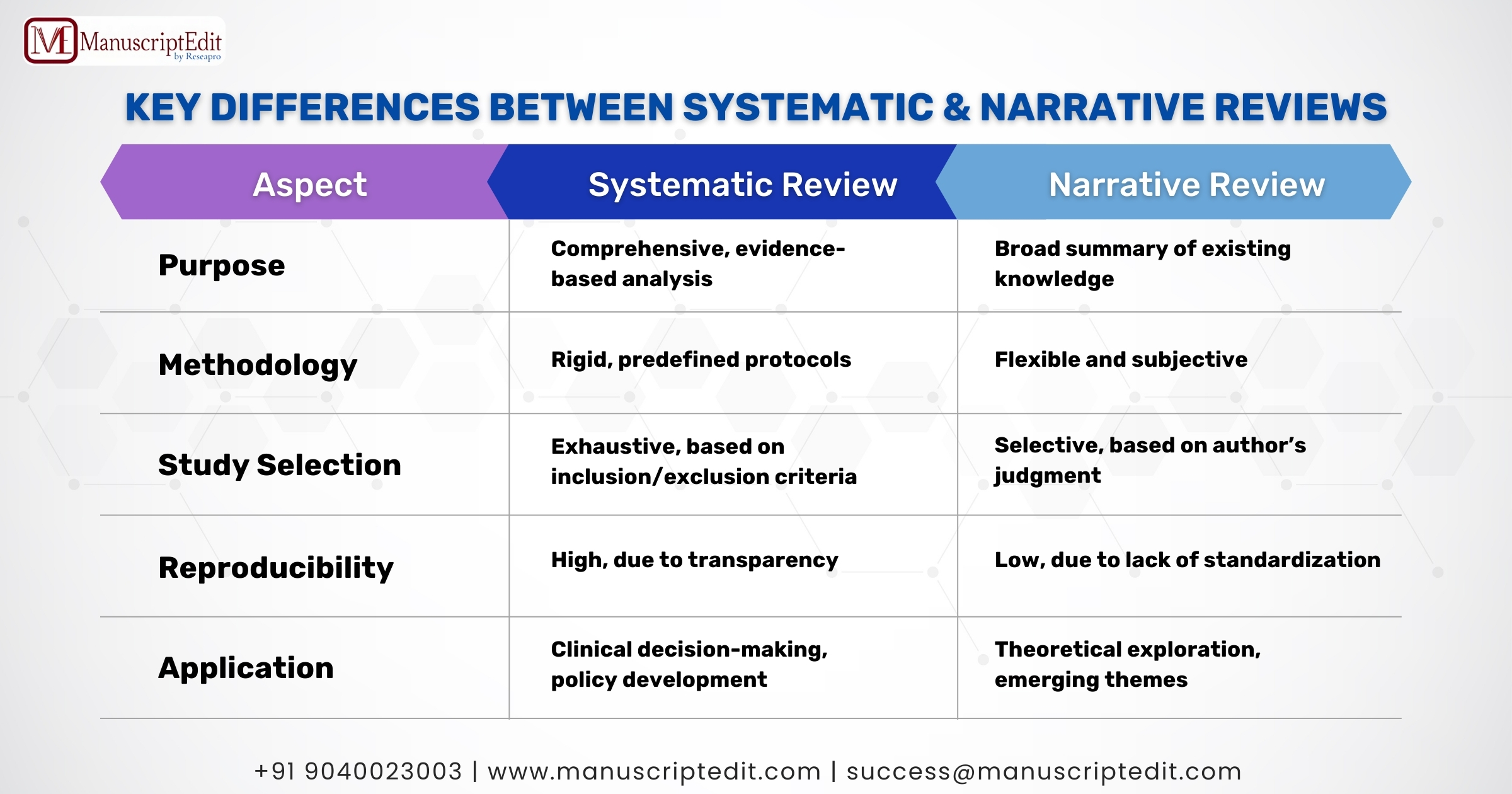|
Getting your Trinity Audio player ready...
|
Academic reviews are critical research tools to synthesize knowledge, inform future studies, and drive innovation. However, the various methods for conducting a review make it hard to know which one best suits the study. There are many different types of reviews—systematic and narrative, among others—which have distinct purposes, methodologies, and applications. This understanding will be crucial in selecting the appropriate review method for the study.

This post will explore the narrative review that offers unique advantages and utility in academic research.
What Is a Narrative Review?
A narrative review is a type of storyteller that artistically and beautifully brings all existing research together to offer an overall qualitative overview. Not strictly bound to set guidelines, it follows the method of thematic synthesis while emphasizing the understanding of all the key trends, findings, and gaps in the literature. Such a review mainly consists of expert opinion and subjective judgment, enabling the author to deliver rich context and perspective.
The key focus of a narrative review is on depth and cohesion in the narrative, not exhaustive quantitative analysis. Because a narrative review draws on relationships between studies, it presents a panoramic view of the research landscape, and that’s precisely why it is helpful for identifying emerging themes or areas to pursue further.
Key Features of Narrative Reviews:
- Flexibility: The narrative review is general and flexible, making it appropriate for exploratory research.
- Thematic Insight: Studies are woven into a story, thus providing an integral understanding of a subject.
- Unstructured Methodology: The authors can include or interpret research that helps to suit their distinct purposes.
While narrative reviews are strong on theory-building and exploration of new topics, they tend to suffer from bias. Because the methodology is not rigorous enough, the reproducibility and objectivity of findings may be sacrificed. Narrative reviews are beneficial when exploring new ideas, knowledge gaps, or conceptual frameworks.
What Is a Systematic Review?
A systematic review, however, represents the meticulous research detective. It uses a rigorous step-by-step methodology to provide comprehensive yet unbiased answers to specific questions. In place of narrative reviews, systematic reviews ensure that all relevant studies are included, hence being transparent, reproducible, and reliable.
Key Features of Systematic Reviews:
- Structured Protocols: explicit inclusion and exclusion of criteria and guide for selecting studies, keeping the process consistent.
- Comprehensive coverage: systematic reviews examine the full breadth of available evidence.
- Quantitative Evidence: Many systematic reviews use meta-analysis, combining statistics for a more profound analysis.
Systematic reviews are considered the gold standard in medicine, public policy, and healthcare because their findings have evidence-based conclusions. It is, however, a very resource-intensive exercise because of the time, expertise, and detailed documentation required.
Comparing Systematic and Narrative Reviews: Core Distinctions
The choice between systematic and narrative reviews depends on your research goals and the nature of your topic.

Choose a Narrative Review, If:
- You are exploring a new area and wish to identify various emerging trends.
- Your research question is broad and open-ended.
- You aim to propose new theories or highlight gaps in the literature.
Example: “Exploring Trends in AI Applications for Education: A Narrative Review.”
Choose a Systematic Review, If:
- Your research question is specific and detail-oriented and requires evidence-based answers.
- You need to support the policy decisions or clinical guidelines.
- Your work must meet rigorous standards for transparency and reliability.
Example: “The Impact of Mindfulness on Workplace Stress: A Systematic Review and Meta-Analysis.”
Challenges in Conducting Reviews
Both forms of reviews have their limitations, which are as follows-
•Narrative Reviews: The flexibility that makes them attractive also exposes them to the questions of subjectivity and selective biasness, making them less reliable for evidence-based decision-making.
•Systematic Reviews: Although the rigour that characterizes them ensures objectivity, the time-consuming and laborious process may take months or even years, requiring technical expertise and resources.
Hitting the wrong note of a review will negatively impact your research goals. The correct method is a matter of getting the right tool for a job which is critical in achieving a high outcome.
Why ManuscriptEdit Is Your Ideal Friend in Research?
Carrying out a systematic review is a meticulous and demanding process that requires accuracy and adherence to stringent protocols. That’s exactly where ManuscriptEdit steps in as your trusted sidekick, offering comprehensive support at every stage of your research process.
Why ManuscriptEdit?
• Expert Team: ManuscriptEdit comprises a panel of experts from different fields of study. It ensures that reviews are field-specific to cater to the needs of your research area. The team has a deep understanding of what will help produce a precise and informative evaluation.
• End-to-End Support: From the initial research design stage to the final preparation of your manuscript, ManuscriptEdit provides end-to-end support to ensure seamless execution and excellent results throughout.
• Time-Saving Tools: They minimize the time needed to conduct a systematic review through streamlined workflows and proprietary tools.
• Affordable Excellence: With ManuscriptEdit, you get affordable excellence in research support by competitive pricing without compromising quality, thus making high-quality research support accessible to all researchers across the globe.
With ManuscriptEdit as your research co-pilot, navigating the complexities of systematic reviews becomes significantly more accessible, allowing you to focus on driving innovation.
Conclusion:
Systematic and narrative reviews are pivotal in advancing academic research. Narrative reviews are well suited for exploratory studies and theory development and provide thematic depth. In contrast, systematic reviews form the basis of evidence-based practices and thus provide rigorous and comprehensive analysis of a specific research question.
This knowledge helps researchers choose the approach most suitable for their work. For those who want to conduct systematic reviews, ManuscriptEdit provides the experience, tools, and support required for the task to be performed with accuracy and minimal time loss.
Ready to take your research to new heights? Explore ManuscriptEdit’s services today and transform your review process into a seamless and impactful endeavour!



